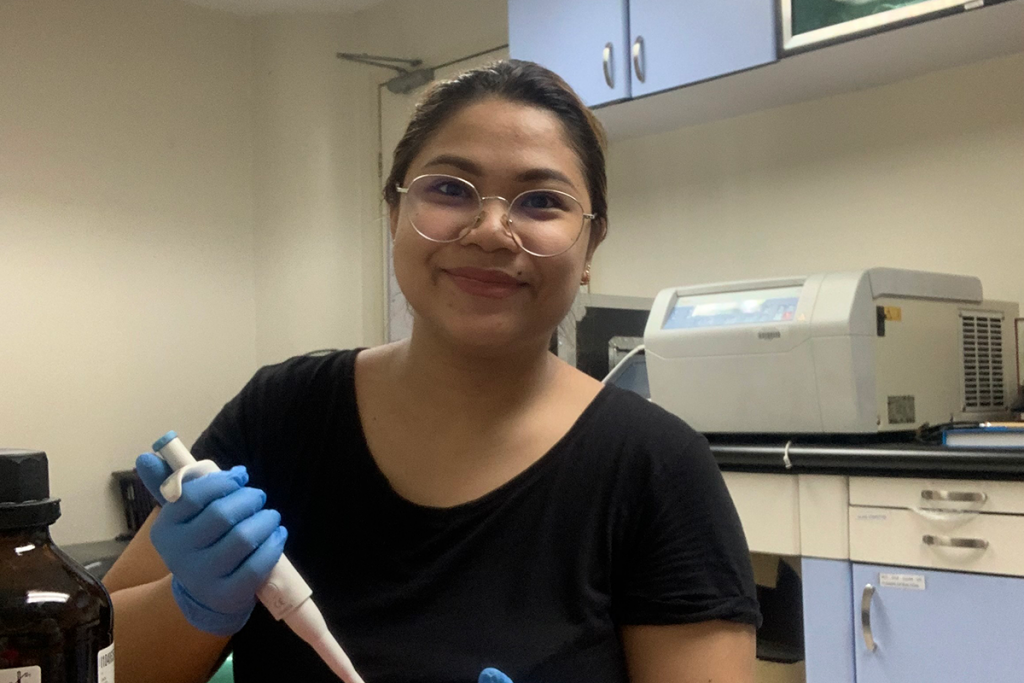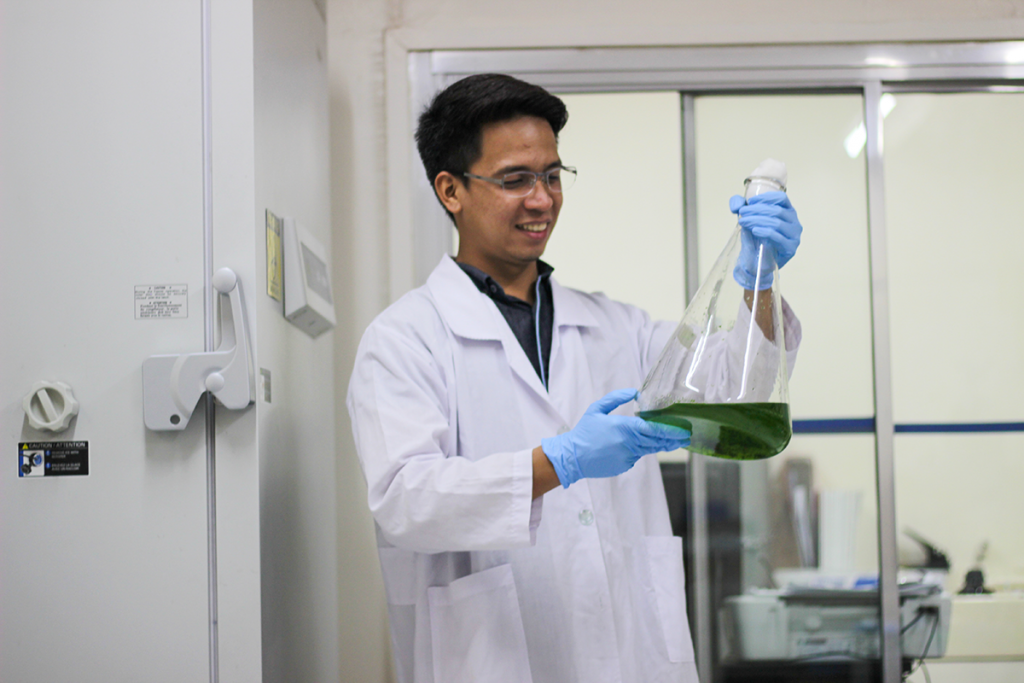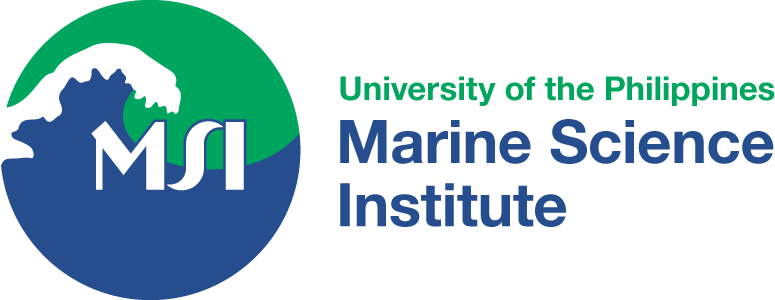Making waves in the Marine Biotechnology track
Written by Dorothy Andrada
There is a wealth of resources found beneath the ocean’s waves, and new breakthroughs in science and technology make it easier for us to use them. Under the Marine Biotechnology track of UP Marine Science Institute’s (UP MSI) MSc and PhD programs, students are taught how to develop the natural products from our marine world: the molecular techniques that allow us to understand and utilize unseen secrets of underwater life.
This is the third in a three-part series on UP MSI’s academic specializations for graduate students. Read the previous features: Diving deep into the Marine Biology track, Turning the tide through the Marine Physical Sciences track

Abby Labios entered MSI thinking of her hometown.
It was discomforting for her to learn that her agriculture officials didn’t even come from Silay City. As a BS Fisheries graduate from UP Visayas, she knew how much potential local fisheries had. But Abby also knew that there weren’t many people who saw that potential the way she did. She was determined to find a way to use her education to give back.
Initially, Abby decided to work under the Associate Dean for Mentoring and Academic Progress and Advancement at the UP Diliman College of Science. After two years as administrative staff, it was an easy decision to pursue graduate studies under her boss. Dr. Eizadora Yu welcomed Abby into UP MSI with open arms.
“More on lab person ako. So when I wanted to pursue my Master’s, pinili ko talaga ang marine biotechnology,” said Abby.
While students in the Marine Biology and Marine Physical Sciences tracks go out to the field to collect samples, students in the Marine Biotechnology track process the data in the laboratory. As part of the Protein Biochemistry and Biotechnology Laboratory, Abby has also attended mini-workshops with the Institute of Chemistry and National Institute of Molecular Biology and Biotechnology.
Abby focuses fully on her classes and her training in mass spectrometry. Unlike many of her peers, she doesn’t work as a research assistant. Instead, Abby supports her studies with a scholarship from the Department of Science and Technology’s Accelerated Science and Technology Human Resource Development Program (DOST-ASTHRDP).
This means that Abby has to earn her Master’s within two years — a difficult thing to do in UP MSI. She admits that it’s overwhelming, but having the full support of her mentor makes it feel doable.
“It’s a learning curve,” Abby remembered Dr. Yu’s advice. “She always says that. It’s okay to fail because that’s what science is. Science is trying everything.”
Under Dr. Yu and Dr. Wilfred Santiañez, Abby is exploring the metabolites of red seaweeds to uncover their applications in biotechnology. And though she plans on pursuing further studies, her heart is set on going back home.
“It could make a difference na babalik tayo sa ating mga localities,” Abby said. “It’s high time na wag na tayong mag-dalawang isip in choosing this path.”

Jeremiah Batucan entered UP MSI inspired by the scientists that came before him.
The story of how Dr. Baldomero Olivera and Dr. Lourdes Cruz discovered the potential of cone snail toxins is legendary among Filipino chemists, but especially so in their alma mater. Jeremiah wanted to follow in their footsteps. So once he graduated from the UP Diliman Institute of Chemistry, he waited for an opening in UP MSI.
After five months, Jeremiah met with Dr. Lilibeth Salvador-Reyes. She told him to pick between working on cone snails or marine cyanobacteria. He chose the latter.
“’Yun ang turning point kung bakit nagustuhan ko talaga dito sa MSI,” said Jeremiah, who describes marine cyanobacteria as his first love. On top of becoming a scientist, he wanted to be involved in medicine. Working with Dr. Salvador-Reyes to develop anti-cancer drugs from cyanobacteria gave him the opportunity to do both.
Jeremiah presented in many conferences throughout his Master’s journey. His most memorable experience is joining the International Summer Course on Marine Natural Products at Bogor, Indonesia. Meeting scientists from Europe and Brazil broadened his horizons. His training as a chemist was complemented by their expertise on the physical and biological side of the field.
He was all set to graduate, nearly completing his thesis on the anti-proliferative activity of compounds from Philippine marine cyanobacteria.
Then the COVID-19 pandemic hit.
The laboratories closed. The samples died. Jeremiah was told he would have to redo his thesis from the start.
Luckily, it wasn’t too difficult to find a new topic. The Marine Pharmacognosy Laboratory examines the pharmaceutical potential of compounds from many different organisms, and the Marine Natural Products Legacy Collection had the resources he needed. His new thesis characterized compounds from a shipworm symbiont.
Jeremiah was still able to apply the techniques he learned, but: “Mahirap tanggapin na nag-change ako ng topic,” he confessed.
More than anything, Jeremiah says, it was the guidance of Dr. Salvador-Reyes that helped him pull through. Now, he is leaving UP MSI to follow his mentor’s footsteps.
In August, Jeremiah will start his PhD in Pharmaceutical Sciences – Medicinal Chemistry at the University in Florida: the same program, school, and research adviser as Dr. Salvador-Reyes. “More on metabolomics and genomics ang field na gusto kong puntahan,” Jeremiah said. “Pero anti-cancer research pa rin.”
Interested in becoming a mandaragat? Halina’t maglayag! Applications for our MSc and PhD programs for the 1st Semester, AY 2024-2025 are currently open. See more information in MSI Academics.
